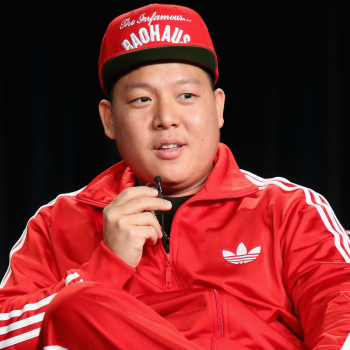Eddie Huang: Thanks for having me, guys.
Brendan Francis Newnam: We had you on out show, reading a selection from your memoir. The New York Times described your memoir as, “An angry book.” It is a pretty clear-eyed look at how tough it is to grow up different in America. What were your worries about it getting adapted into a network sitcom?
Eddie Huang: Yeah, no. I wanted it to keep that fire. Like, I feel that, a lot of people that do network shows, or things that are more mainstream, they feel they need to cater to an audience. But if you go around America, like I have on the VICE show and through my college speaking, you meet people who are from middle America, and they’re like, “I want to see what else is going on. I’m sick of being fed the things people think I want.” And I wanted to tell people in the studio, the network, “Look, man, middle America is ready.” If we keep the energy and we keep the passion, we keep a little bit of the anger as well, that’s what people want to see. They want to see the truth. People want honesty in this generation, I think that’s a very defining characteristic.
Rico Gagliano: Was there a moment that was added to the show or maybe taken out because you made that stand?
Eddie Huang: Yeah! You know, there are a lot of voice-over lines that were written for me, and the one line that, you know, I wrote about it in New York Magazine, they wanted me to give the credit to America. Like, “Isn’t America great! Jewish kids and Asian kids and Black kids can all get along and go to a Beastie Boys concert!” But for me, I was like, “This only happens on TV, bro.” If three of us friends were at a concert, we wouldn’t be like, “Man, America’s great!” No, man. We’re individuals. Like, America didn’t give us free tickets to a show so we could all go.
Brendan Francis Newnam: It’s a really entertaining show. There is one scene where Eddie is about to be befriended by the White kids at school, until they smell the Taiwanese food he brought for lunch. Asian food is really something that causes you to be ostracized from the larger society, in the show. But, 20 years later, you serving the same food is what lead the world to embrace you. So, what changed in those 20 years, do you think?
Eddie Huang: You know, when you were a kid, in America, and you were Asian in the 80s and 90s, it was… I really wanted to fit in. You’re always just trying to hide the fact that you’re an alien, in a lot of ways. Like, “I hope they don’t find out. I hope they don’t find out the things that I’m eating. I hope they don’t find out the things my mom thinks in her head.” But the last 20 years, Asians have really broken down the barriers personally. And it hasn’t been reflected in dominant, mainstream culture, but person-to-person. You see interracial marriage. You see people doing study abroad and, as corny as it is, you see people’s Instagrams of study abroad…
Interacting and meeting people from different cultures has broken down the walls in people’s minds as individuals. Finally, media is catching up.
Rico Gagliano: Alright, fingers crossed. Meanwhile, this is your chance to offer advice, person-to-person, to our listeners. Are you ready for these questions?
Eddie Huang: Mmhm!
Cozy up in the banquette, just not too cozy
Rico Gagliano: Alright! Here is something from Chris in Boston, Mass.
Eddie Huang: Oh, god.
Rico Gagliano: Chris writes: “Where should you sit when you are on a date and the host or hostess puts you in one of those rounded corner booths?” I guess it’s, like, do you kinda cozy up?
Eddie Huang: I feel like you just cozy up! You know, you gotta, like, take the initiative. If you’re on a date, I think it’s fine to take the initiative and make it personal.
Rico Gagliano: It matters which date it is, right? The first date, I think that’s a tougher question, though.
Brendan Francis Newnam: But how could you not cozy up at a rounded corner booth?
Rico Gagliano: You could sit uncomfortably at the sort of tips of the horseshoe. You know? If you’re looking at the booth from above?
Brendan Francis Newnam: That is not a date.
Rico Gagliano: I know it’s awkward.
Eddie Huang: But that’s like… There’s no other thing that says, “I’m a wimp” more than “I’m going to make sure I’m not offending you here.”
Rico Gagliano: Yeah.
Brendan Francis Newnam: Also, there are two people involved in this situation. If you sit too close, the other person can move to the side. You’re fine.
Eddie Huang: She can move!
Rico Gagliano: Yes, don’t chase after the person.
Brendan Francis Newnam: Yeah, don’t slide around the booth!
Eddie Huang: If she moves don’t move again! Yeah. It’s a one-move thing. It’s definitely, you make your move, and that’s it. Yeah. A north-south move.
Should restaurant staff eat customer scraps?
Brendan Francis Newnam: There you go, Chris. Good luck with that. Our next question comes from Gregorio in the Bronx. Gregorio writes: “When I was working in a local bar as a cook, I would frequently see front of house staff eating the food left on a plate after the customer was done with it.”
Eddie Huang: Oh, that’s so ratchet!
Brendan Francis Newnam: “…Am I wrong in thinking this is absolutely skeevy?” which, for those who don’t know, you just said ‘ratchet,’ like the tool, which is slang for skeevy.
Eddie Huang: That’s so nasty. Yeah, it’s slang for skeevy. Yeah, it’s just…
Rico Gagliano: But you ran a restaurant, you have to have seen something like that happen on occasion?
Eddie Huang: Oh, yeah! Dude! I’ve seen people bring salads back to the kitchen and eat the croutons off it. And I’m like, “Bro. You can get a new crouton.”
I mean, sometimes I’m tempted, too. Because you can see a dish that nobody’s touched. As a chef or a cook, I will, if something is sent back or they complained about it, I will taste it because that’s part of my job, to make sure everything is OK. Otherwise, just for pleasure? Absolutely not.
Rico Gagliano: And the other, I guess, solution to this would be to actually feed the waiters so that they’re not stealing people’s food.
Eddie Huang: Yeah.
Brendan Francis Newnam: Well, they usually have a staff meal beforehand.
Rico Gagliano: Apparently that doesn’t happen at Gregorio’s.
Eddie Huang: I have a funny story, too. Because we’re next to a KFC, Baohaus. So, you know, we took away staff meal for a second because people were totally abusing it, just like eating five or six baos a shift. I was, like, “Guys, c’mon. We maybe sold three baos a shift and you ate six.” So there was a guy, in an act of defiance, I think, he went to KFC, bought a bucket of KFC, put it on the counter, and was just eating KFC while serving. I was like, “Bro, we serve fried chicken here,” and he was like, “But you don’t give it to me for free any more!”
Rico Gagliano: Oh, man.
Eddie Huang: So we had to come to a little bit of a compromise.
Ask for a fork if you must, but know you will be judged
Rico Gagliano: So, there you go Gregorio. It is skeevy, you are correct. Here is something from Liz in New Haven, Connecticut. “Is it OK,” she writes, “to ask for a fork at an Asian restaurant where chopsticks are the norm?”
Eddie Huang: Look. I hate it, but it’s fine. I have a lot of Chinese, Taiwanese, Korean, Cantonese, friends. My friend Steven Lao, who is the manager of Baohaus — I’m going to put him on blast — dude is the worst. I have been friends with him for 10 years. This man, first question when he sits down at a Chinese restaurant, “Uhh, can I get a fork?” I’m like “You just stabbed a dumpling! Juice came out! What are you doing?”
Brendan Francis Newnam: But you’re saying it’s OK?
Rico Gagliano: You hate it, but it’s OK?
Eddie Huang: I will judge you, but it’s fine.
There are things, though, like a piece of sushi, where, if you use a fork, you are adulterating it. Because sushi is all about mouthfeel, and the cutting of it, and the rice staying together. You kinda need to use chopsticks or fingers.But, still. Half my Asian friends in New York are just stabbing things with forks.
Brendan Francis Newnam: Let’s have a caveat. Sushi with a fork, never OK. That’s ridiculous.
Half-doughnuts for all
Brendan Francis Newnam: This next question comes from Trevor in Scottsdale, Arizona. Trevor writes: “Does half of a doughnut in a box mean that someone has claimed it, or that they only wanted half and the rest is up for grabs?”
Eddie Huang: OK. So. This is an easy one, right? If it’s just a half a doughnut and it looks like somebody bit it, that’s been claimed. Also, the person that put it back in, is ratchet. But, now, if there is a knife in the box and the doughnut has been cut in half, then that’s fair game. That is a half a doughnut left for you.
Rico Gagliano: Yeah, that’s right. It’s, basically, is it a jagged or straight-line cut?
Eddie Huang: Yes. But I have always looked at these doughnuts that are half-chewed. Like, who does that? Who throws a shoe and who puts a doughnut that’s been bitten back in the box?
Rico Gagliano: You can also do the move where, if it looks like it’s been bit into, where you take a knife and cut off that part. What about that?
Eddie Huang: I do that.
Brendan Francis Newnam: That’s a lot of work!
Eddie Huang: I do that. I like the more environmentalist, sustainable approach to the second-bite doughnut. You know? I like that.
Rico Gagliano: You have to consume it.
Brendan Francis Newnam: I read something recently where, when there’s one whole doughnut left, but you want to be respectful that it’s the last doughnut, you pick it up, hold it up, and say, “Does anybody else want this doughnut?” But, of course, you’re holding it. So you get to keep it.
Eddie Huang: Yeah, it’s yours. That’s like when you kinda fake pull out your wallet to pay for something. “Oh, you go this? Oh! OK. Cool, man.” That’s that move.
Rico Gagliano: Eddie Huang. That is all the time we have. Thank you so much for telling our audience how to behave. Or not to behave.
Eddie Huang: Alright! Behave yourselves!


